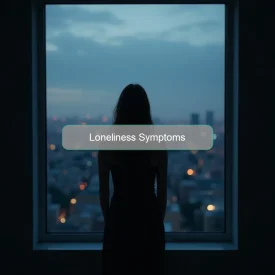Dealing with loneliness as a man can be isolating and hard to admit, but many of us share the struggle.
The good news? You can deal with it by acknowledging your feelings, practicing self-care, building social ties, and seeking help when needed. Start small—reach out to a friend or join a group—and remember, addressing loneliness boosts your mental and physical health.
Recent stats show 25% of U.S. men aged 15-34 feel lonely a lot on a given day, higher than women in the same group. It’s a growing issue, but actionable steps like exercise, hobbies, and open talks can turn it around.
Key Takeaways:
- Admit that loneliness is real and okay. Writing or thinking about your feelings helps you heal and grow.
- Take care of yourself by getting enough sleep, eating well, exercising, and enjoying hobbies—these improve your mood and help you connect with others.
- Reach out to family, friends, or join groups, and be open and honest to build stronger friendships.
- Notice signs like pulling away or trouble sleeping, and don’t hesitate to talk to a therapist or join support groups to prevent things from getting worse.
Understanding Male Loneliness
Loneliness is feeling emotionally isolated, no matter where you are. For men, it often happens because society discourages them from showing their feelings and because they do not have many close connections. To explore the deeper loneliness meaning, read our dedicated article.
Are Men More Prone to Loneliness?
Yes, studies suggest men are more susceptible. About 15% of men have no close friends at all.
Men report having 50% fewer close friendships than women on average. This gap widens with age, work stress, and life changes.
Societal norms push men toward independence, making it harder to form intimate ties. Younger men (Gen Z and millennials) top loneliness rates at 25% in the U.S.
Strategies to Deal with Loneliness as a Man
Doing small things every day helps you feel less lonely over time. These easy steps can fit into your routine.
Pick one or two ideas that feel right, and keep building from there for lasting change. Start by working on yourself, then reach out to others.

Mental and Emotional Strategies
Start by addressing your inner thoughts and feelings to build resilience.
- Acknowledge and Accept Your Feelings
Admit that loneliness is real and there’s no shame in it. This acceptance is the crucial first step toward healing.
Try journaling or speaking your thoughts aloud to process them. Doing so eases internal tension and paves the way for positive changes.
- Embrace Self-Reflection for Personal Insight
Use alone time wisely to gain a deeper understanding of yourself. Think about the types of relationships that matter most to you. Ask yourself what kinds of connections you’re truly missing.
Mindfulness apps can guide you through structured reflection sessions for better clarity.
- Embrace Vulnerability and Open Communication
Start sharing your true feelings to create stronger trust in relationships. Begin with people you feel safe around to practice this skill.
Vulnerability breaks down emotional walls common in men. It ultimately leads to more authentic and supportive male friendships.
Physical and Lifestyle Strategies
Boost your body and daily habits to improve mood and reduce isolation.
- Practice Self-Care and Healthy Lifestyle Choices
Focus on essentials like good sleep, balanced meals, and personal hygiene. These habits naturally lift your mood and increase your energy levels.
Steer clear of routines that keep you isolated indoors all day. Instead, build in time for fresh air or simple relaxation to stay grounded.
- Stay Physically Active Through Exercise
Regular exercise releases endorphins that help combat feelings of loneliness. Aim for at least 30 minutes a day, such as brisk walking or a quick gym workout. It not only improves your well-being but also opens doors to social interactions.
Joining team sports or group classes can make it even more effective.
- Develop Hobbies and Learn New Skills
Choose activities that genuinely interest you, like reading books or trying out cooking recipes. Hobbies provide a positive distraction and can lead to natural conversations with others.
Enroll in online courses or attend local workshops to expand your skills. This way, you’ll meet people who share your passions.
- Avoid Toxic Coping Mechanisms Like Substance Abuse
Resist turning to alcohol, overwork, or other harmful habits as escapes. These only deepen loneliness in the long run.
Instead, opt for positive alternatives like exercise or professional therapy. Making this shift protects your health and promotes real recovery.
Social and Community Strategies
Reach out and engage with others to create meaningful bonds.
- Build and Strengthen Social Connections
Make an effort to nurture your existing relationships actively. Set up regular phone calls or in-person meetups to stay in touch.
Prioritize quality interactions over having many superficial ones. Over time, these efforts create a stronger support network.
- Reconnect with Family, Friends, and Old Acquaintances
Reach out to people from your past with a simple, genuine message. Something like “Hey, I’ve been thinking about you” can reignite old bonds.
Family often offers reliable emotional support, so don’t ignore those ties. Consistent small gestures help rebuild and maintain these connections.
- Make New Friends and Foster Deeper Bonds
Take initiative by attending events or using apps designed for platonic friendships. Start conversations and be open to new people in your community.
Gradually share more personal thoughts to build trust and depth. This proactive approach turns acquaintances into meaningful friends.
- Join Groups, Clubs, or Men’s Support Networks
Seek out groups tailored to men’s experiences to tackle loneliness directly. Explore local options like sports teams, book clubs, or volunteer organizations.
Online communities, such as Reddit’s r/AskMen, provide instant ways to connect. Participating regularly helps you form bonds with like-minded individuals.
- Volunteer and Engage in Community Activities
Take part in causes you care about to feel more meaningful and connected. Volunteering introduces you to new people while making a positive impact. It breaks the cycle of isolation by shifting focus outward.
Choose activities that align with your interests for the best experience.
Technology Strategies
Use digital tools wisely to connect without over-relying on them.
Use Technology for Positive Connections
Use apps for virtual meetups or chats based on shared interests. Set boundaries to prevent mindless scrolling that can worsen loneliness. Opt for video calls to keep ties strong with far-away friends. Technology, when used mindfully, bridges gaps effectively.
Consider AI Companions for Extra Support
If you’re feeling disconnected and real-life conversations aren’t always easy to come by, digital companionship might help. Some people find comfort in spending time with an AI Girlfriend for casual, low-pressure chats—just someone to talk to when things feel quiet. It’s not a replacement for human connection, but it can ease that sense of isolation when you’re going through a tough patch. If you’re curious, here’s a breakdown of what an AI girlfriend is and how it works.
Signs and Symptoms of Loneliness
Loneliness can manifest in subtle ways, but certain signs indicate it’s worsening and affecting daily life.
Key indicators include:
- Increased social withdrawal: Avoiding events, ignoring calls, or isolating more than usual.
- Obsessive social media use: Scrolling endlessly for connection, yet feeling more empty.
- Overworking or serial dating: Using work or fleeting relationships as distractions from an inner void.
- Emotional shifts: Heightened self-criticism, irritability, or persistent emptiness.
- Physical symptoms: Frequent headaches, sleep disturbances, overeating, or neglecting self-care like grooming.
If these persist, loneliness may be intensifying—address them early to prevent deeper issues.
To learn more about loneliness symptoms, explore our comprehensive article on the topic.
Causes of Loneliness in Men
Loneliness in men often stems from a mix of cultural, personal, and environmental factors. Understanding these root causes can help you address them effectively and take proactive steps toward building stronger connections.

Societal Expectations and Toxic Masculinity
Society often expects men to be strong and handle problems on their own, not showing their feelings. This idea, called toxic masculinity, makes it hard for men to open up and build close friendships. Because of this, many men keep their feelings inside and feel lonely.
Lack of Close Friendships and Male Intimacy Barriers
Men usually have fewer close friends than women, and about 15% of men don’t have any close friends at all. Men are often afraid to seem weak, which stops them from forming close bonds. Over time, this makes loneliness worse.
Career Pressures and Work-Life Imbalance
Work can be very demanding, and men often focus more on their jobs than on friends or family. Long hours and stress at work make men tired and less likely to spend time with others. This creates more loneliness.
Mental Health Conditions Contributing to Isolation
Problems like depression or anxiety can make men want to avoid social contact. When these mental health issues are not treated, loneliness gets worse because it becomes harder to connect with others. Getting help early can improve things.
Life Transitions and Aging Factors
Big life changes like retiring, going through a divorce, or losing a partner can increase loneliness in older men. As men get older, they often lose friends or their friends move away, which makes them feel more isolated.
Impact of Technology and Social Media
Technology can help people stay connected, but using it too much can lead to shallow relationships. Social media can also make men feel like they are missing out or not good enough, making loneliness worse. It’s important to balance time online with face-to-face time.
For more in-depth information on the causes of loneliness, please read our detailed article on the topic.
The Impact of Loneliness on Men’s Health
Dealing with loneliness as a man is very important because it affects mental, physical, and social health.
Loneliness can increase the chance of feeling depressed, anxious, or even thinking about suicide. Men often have higher suicide rates because being alone can cause a lot of stress and make them feel hopeless if they don’t have enough support.
Physically, loneliness increases the chances of heart disease, inflammation, cancer, hypertension, obesity, and dementia, ultimately shortening life expectancy and worsening chronic conditions.
Socially, loneliness strains relationships, causing men to withdraw further, which can harm work performance and create disconnects within families.
Addressing loneliness is important for improving overall well-being and quality of life.
Seeking Professional Help
Loneliness doesn’t always go away on its own, especially if it lasts a long time or starts messing with your everyday routine.

Recognizing When Professional Support is Needed
Look out for clear signs that loneliness is getting serious, like feeling empty all the time, having trouble sleeping, or even thinking about suicide. Other red flags include losing interest in hobbies or struggling at work due to low mood. Don’t put it off—reaching out to a pro can stop things from getting worse and help you feel more in control.
Therapy and Counseling Options for Men
Find a therapist who gets men’s unique challenges, such as dealing with societal pressures or emotional barriers. Cognitive behavioral therapy (CBT) is a great choice, as it teaches you to change negative thought patterns and build healthier habits step by step.
Support Groups, Hotlines, and Resources
Join support groups just for men, where you can share experiences in a safe space—many are available online or in person. For immediate help, know the local crisis hotlines to call in your area.
Final Thoughts: Overcoming Loneliness as a Man
Loneliness doesn’t define who you are. It’s a challenge you can overcome with small, steady steps. By accepting your feelings, taking care of yourself, and reaching out to others, you’re taking charge of your life.
Remember, real strength comes from being open and asking for help. Start now. Reach out, think things over, and rebuild your life. A more connected and fulfilling future is waiting. You can do this.
Frequently Asked Questions
Why are men more prone to loneliness than women?
Men often have fewer close friendships and face societal pressure to be emotionally stoic, making it harder to express feelings and build intimate connections. This can increase feelings of isolation and loneliness.
Is male loneliness a new phenomenon, or has it always existed?
Male loneliness isn’t new. Men have long faced more loneliness than women because society expects them not to show emotions or build close friendships. Recent changes like social media and shifting gender roles have made it worse, but it has always been a challenge.
Can technology help combat loneliness for men?
Yes, technology such as virtual meetups, chat apps, and online support groups can help men connect with others. However, mindful use is important to avoid negative effects like excessive social media use that can worsen loneliness.
What does loneliness do to a man?
Loneliness affects men’s mental, physical, and social health. It can cause depression, anxiety, and a higher risk of serious illnesses like heart disease and dementia. It also leads to withdrawal from relationships and work. Dealing with loneliness is important for overall well-being.





